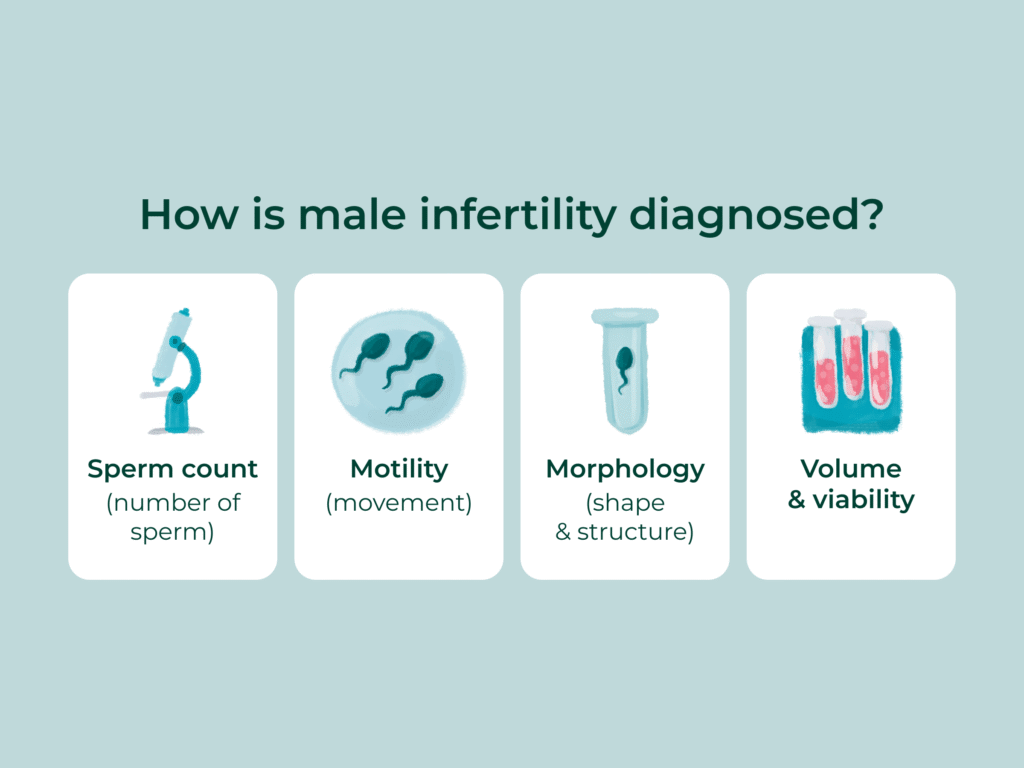Infertility isn’t just a woman’s problem. Having troubling conceiving affects approximately 15% of couples, and up to 50% of cases involve a male factor. This means the male partner has trouble getting his female partner pregnant, either because of sperm issues, hormone imbalances, genetic concerns, lifestyle factors, or a combination of any of the above.
Infertility in men is under-assessed and under-discussed, perhaps due to stigma, taboo, or pride. But the good news is most of its causes are reversible and there are options to help men and their partners successfully conceive. Sometimes it might just take a little help from a double board-certified reproductive endocrinologist or reproductive urologist, doctors who specialize in infertility.
Here’s what to know about male factor infertility (MFI) including causes, diagnosis, treatment options, and more.
How common is male factor infertility?
Up to half of cases of heterosexual couples with infertility are due to male issues, according to research. That means almost half the time the problem with conceiving is due to a male factor (such as sperm count or quality of sperm), or a combination of male and female factors.
And as with female fertility, research has proven that the quality of sperm decreases with age as testosterone levels dip, with a general decline occurring after the age of 40.
Causes of male factor infertility
In addition to paternal age, there are other reasons a man might be struggling to get his female partner pregnant.
Lifestyle factors:
- Cannabis use and other recreational drug use
- Excessive alcohol consumption
- Testosterone therapy
- Obesity, including sedentary lifestyle and poor diet
- Frequent heat exposure (hot tubs, saunas, etc.)
Other possible causes:
- Azoospermia (no sperm) or severe oligospermia (low sperm count)
- Abnormal sperm movement or shape unexplained by lifestyle factors
- Hormonal abnormalities
- Genetic concerns such as Y-chromosome microdeletions and Klinefelter syndrome
Testosterone and male fertility
Men with low testosterone levels may be prescribed testosterone therapy (TRT). This treatment is essentially male birth control since it can suppress sperm production (spermatogenesis), which can induce severe oligospermia (low sperm count) or azoospermia (no sperm at all).
When a man uses TRT, the brain senses the presence of excess testosterone and shuts off signals to the testes to produce both testosterone and sperm. However, this can be reversed and generally, sperm production can return to normal within several months of stopping therapy.
Diagnosing male infertility
The key first line of testing for male fertility is a semen analysis (SA), which tests multiple parameters:
- Sperm concentration: A minimum of ≥15 million sperm/mL is considered within the normal range.
- Sperm movement: Progressive motility should be ≥40%, with ≥50% total motility considered normal.
- Sperm morphology/shape: At least 14% of sperm should exhibit normal head and tail morphology; values ≤4% are typically associated with infertility.
- Semen volume: Total ejaculate volume should be ≥1.4mL.
- Sperm viability: ≥75% of sperm should be alive.

In addition to a semen analysis, your doctor may also order blood tests to check hormone levels, a physical examination to look for structural abnormalities, and/or genetic testing to help explain extremely low sperm counts.
Emotional consequences of male infertility
Anyone who’s been through infertility knows it’s an emotional struggle as much as a physical one. Male factor infertility can come with its own interpersonal and psychological challenges, including:
- Stress
- Strain on the relationship
- Shame and failure
It’s common to struggle with these feelings, but it’s important to keep in mind that MFI is a medical condition that should be normalized. There’s no shame or stigma in seeking guidance from medical providers, support groups, and/or therapists.
Treatment for male infertility
The good news is most causes of MFI are reversible; there are treatment options to help these men and their partners successfully conceive. Treatment depends on the patient, but can include:
- Lifestyle modifications such as stopping smoking or drinking
- Medication to correct hormone levels
- Fertility treatment such as intrauterine insemination (IUI) and/or in vitro fertilization (IVF) with intracytoplasmic sperm injection (ICSI)
- Surgical intervention by a reproductive urologist (if structural issues are present and the case of MFI is severe)
When to see a fertility specialist
It’s important to book an appointment with a board-certified reproductive endocrinologist and/or ask your PCP for a referral to one if the:
- Partner with ovaries is not pregnant after 6 months of trying if over age 35
- Partner with ovaries is not pregnant after 12 months of trying if under age 35
- Partner with ovaries is not pregnant after 3 months if age 40+ or if there are recurrent assisted reproductive technology (ART) failures
CCRM offers treatment and support for men and couples struggling to conceive, and we’re here to help you every step of the way. To book a new patient consultation with a fertility specialist at your nearest CCRM location, click here.
CCRM’s network of world-renowned physicians offers personalized care and proven results to help you build your family faster.






